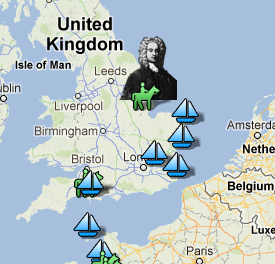A new online resource brings together the travel journals and memoirs of English physician Dr. Martin Lister (1639-1712): Every Man’s Companion: Or, a Useful Pocket-Book.
As a medical student in Montpellier, Lister kept pocket books of his lessons and observations. Here he closely documented, among other things, the medical texts and recipes he used and acquired and the many observations on natural history that were the mark of a gentleman-naturalist. This site, by medical historian Dr. Anna Marie Roos, traces Lister’s peregrinatio medica, his travels for the purposes of medical education, from England to Montpellier and home again via Paris. Also included on the site is a page detailing the books that accompanied Lister on his travels and during his schooling

Detail from Dr. Roos’ interactive map of Lister’s travels.
Further reading:
For more about medical travel and foreign medical education in the early modern period, see Ole Peter Grell, Andrew Cunningham, and Jon Arrizabalaga’s edited volume Centres of Medical Excellence?: Medical Travel and Education in Europe, 1500-1789. Burlington, VT : Ashgate, 2010.

